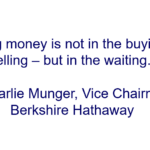In this Tech Strategy Podcast, we dissect Constellation Software’s remarkable investment strategy. Digital strategy consultant Jeffrey Towson reveals valuable lessons for investing in software businesses navigating the ever-evolving tech landscape.


In this Tech Strategy Podcast, we dissect Constellation Software’s remarkable investment strategy. Digital strategy consultant Jeffrey Towson reveals valuable lessons for investing in software businesses navigating the ever-evolving tech landscape.

In his insightful article, Jeffrey Towson outlines essential considerations for B2B tech strategy. He emphasizes the impact of digital transformation on businesses and highlights the unique role of a digital strategy consultant.

Constellation Software, a successful investor in the tech industry, provides valuable lessons for other investors. Their strategic approach emphasizes acquisitions, vertical markets, and long-term value creation. Jeffrey Towson, a digital strategy consultant, details 5 lessons from Constellation’s approach.

This article by digital strategy consultant Jeffrey Towson dives into the evolving business models of mapping companies. It explores what mapping companies are and provides three prime examples: Sanborn Maps, Waze and Google Maps. However, the article also touches upon the challenges faced by mapping companies in the digital age, suggesting a need for a strong digital transformation strategy.

In Part 1, I argued there are four strategy questions for ARM: Will they continue to benefit from a secular trend? Is their tailwind continuing? What is the state of their core product and growth engine? What are the competitive strengths of their business model? Are they changing? Are there external CGT factors that will […]

In this podcast, we explore the four digital concepts that are powering ARM Holdings’ tech strategy. We explain how these concepts are helping ARM to stay ahead of the competition and what other companies can learn from them. If you’re interested in learning more about digital strategy and how it can help your business, then this article is for you.

In this podcast, Jeffrey Towson discusses the concept of “criticality” as a type of switching cost. He specifically talks about Wabco, one of Warren Buffett’s companies that has fairly powerful B2B criticality. Wabco is a supplier of braking systems for trucks and buses, and its products are critical to the operation of these vehicles. As a result, customers are reluctant to switch to other suppliers, even if Wabco’s prices are higher. This gives Wabco a strong competitive advantage.

I like the saying that winning in digital B2C is like catching lightning in a bottle. But winning in digital B2B is more like mining. The former happens really fast but is difficult to predict. The latter is slower but pretty reliable when you’re in the right spot. You just keep digging away over time. […]

In this podcast, Jeffrey Towson discusses the three effects of network effects, and how they can be used to create a competitive advantage. He also talks about So-Young, a Chinese marketplace for beauty services, and how it is using network effects to grow its business.

In this class, Jeffrey Towson discusses four options that Huawei could have taken to respond to the US tech ban. These options include fixing the supply chain and staying the course, becoming a digital platform, ignoring Europe and focusing mostly on China, and trying to build an anti-US alliance for smartphone operating systems. Towson argues that Huawei should have focused on becoming a digital platform, as this would have allowed the company to continue to innovate and grow.